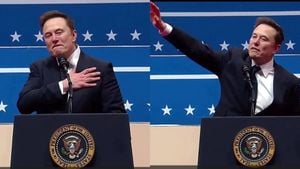OpenAI is caught up in legal turmoil, prompted by lawsuits from co-founder Elon Musk as questions swirl around control and profit structure of the organization. The backdrop of this dispute dates back to the founding of OpenAI itself, with Musk asserting rights to control over the AI research organization. The tension flared as OpenAI sought to evolve from its original nonprofit model to what it calls a capped-profit framework. This shift is viewed by some as necessary to attract the vast capital needed for developing artificial general intelligence (AGI).
Elon Musk, who left OpenAI's board of directors amid campaigning for power and control, now finds himself at odds with the organization he helped create. According to OpenAI’s recent blog post, Musk had pushed for transitioning the entity to a profit-driven model since its inception back in 2015. OpenAI's claims are underscored by Musk's actions, detailed within internal communications, showcasing his push to shape the organization’s future.
According to OpenAI, Musk’s involvement wasn’t merely supportive; he was actively searching for ways to seize control of its direction. Backtracking over the timeline, it’s evident Musk even requested majority ownership and control over the future of OpenAI, deeming it necessary for their ambitious objectives. OpenAI’s blog clarified Musk's prior vision included merging with Tesla, adding weight to the claims of his drive for controlling interests and management.
This saga began taking shape around November 20, 2015, when OpenAI was launched as nonprofit. Musk quickly expressed doubts concerning this model, stating the structure seemed “non-optimal,” and proposed integrating profit with nonprofit journeys as early as early 2017. His vision shifted as the organization began to realize the financial demands for developing AGI technology. By mid-2017, conversations began to intensify around moving to the for-profit model.
OpenAI's 2018 internal communications reveal Musk's anticipation of impending failure if the organization didn’t merge with Tesla. The stakes were evidently high; Musk valued this change to create synergies and secure necessary funding. He warned of “certain failure” and suggested radical restructuring within Tesla to accommodate OpenAI’s needs. OpenAI, standing its ground, resisted these calls citing concerns of giving Musk unilateral control and the mission to develop AGI for the benefit of humanity.
The situation escalated by fall 2017 as negotiations fell apart. Musk's insistence on absolute control clashed with OpenAI’s founding vision, which prioritized collective governance over absolute power. Internal emails from this time showcase the brewing discord, with Musk proposing terms for the company structure where he would retain initial control and decision-making authority. For OpenAI, this was unacceptable.
By February 2018, the tensions reached boiling point, and Musk resigned from his position as co-chair within OpenAI, citing divergent visions for the organization. From then on, Musk’s competitions emerged with the founding of xAI, as he shifted his focus toward competing against the very entity he originally co-founded.
The tensions resurfaced with Musk’s latest legal move against OpenAI. His lawsuit—seeking to prevent the organization from fully pivoting to the for-profit sector—has ignited speculation about his motivations. Is it self-interest at play as he cultivates his own competitor? With promises of major advancements within xAI, it raises questions surrounding market competition and innovation.
Current interactions reveal the complexity of the legal situation, as attorneys representing Musk accuse OpenAI of mismanagement and straying from the principles established during its inception. Interestingly, they argue-overwhelmingly-that OpenAI’s shift to profit-driven models violates fiduciary duties set forth during the founding stages.
OpenAI has publicly countered Musk’s allegations by citing his own past communications as contradictory, noting he consistently expressed support for profit structures and even advanced ideas on governance embodying such frameworks. OpenAI’s position is clear: Musk had his chance to control it but chose to walk away when terms did not favor him. Their response reflects the intense rhetoric and reframing of Musk's original intentions.
Notably, OpenAI is now gearing up for its forthcoming transition, planning extensive restructuring to streamline operations and refine its equity models. Recent court filings highlight the organization’s ambition to reshape itself under new regulations to adapt to the rapidly changing AI space. Amid rising competition, particularly Musk's xAI venture, the transition is foreseen as key for OpenAI’s future.
OpenAI's push for establishing itself as the premier AI research laboratory remains at the forefront of their mission statement. Their goal? Ensure AGI develops safely and beneficially for humanity, even amid contenders like Musk’s xAI coming on the scene. They indicated competitive advantages are now etched against the backdrop of intensive legal scrutiny; the past must inform their strategy going forward.
Musk's quest, meanwhile, endeavors to disrupt, innovate, and expand AI technology to meet increasing market demands. With AI positioned to experience exponential growth, Musk's xAI is entering the conversation with significant backing, presenting formidable challenges to OpenAI’s future prospect.
Legal entanglements rarely occur without deep-rooted motives. The multiple lawsuits and accusations being volleyed between these tech titans serve to spotlight the fractures unsettling the AI community—exemplifying larger narratives of power, innovation, and the future of technology all competing under the surface.
Overall, the confrontation encapsulates much more than personal grievances—it is representative of the trials and tribulations facing innovation as ambitious tech leaders jockey for influence over the uncertain terrain of AGI. This environment is vibrant and volatile, and as the AI race heats up, the rest of the world watches intently.



